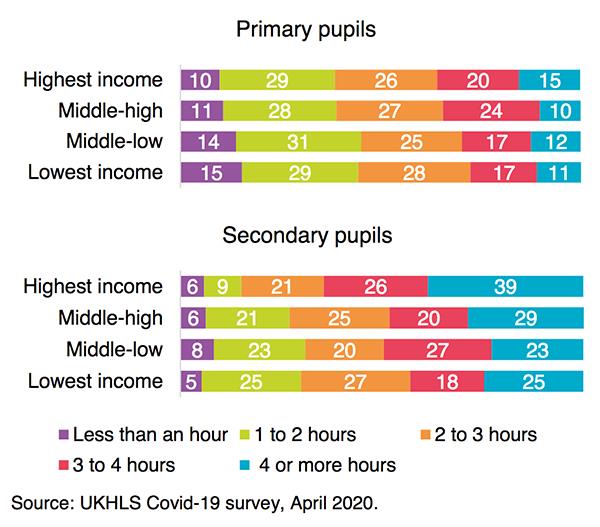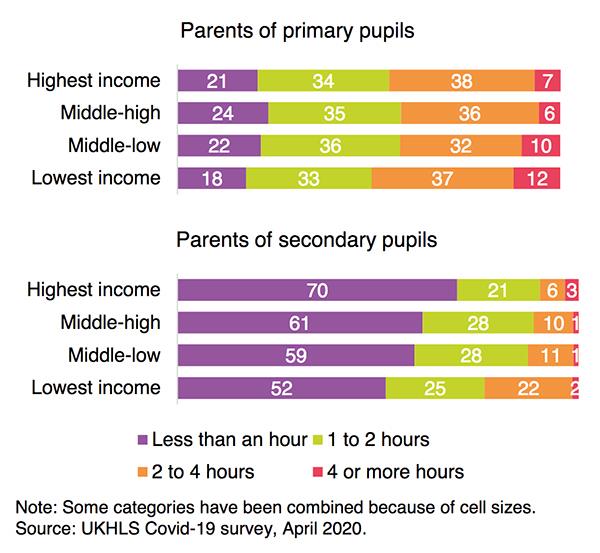It comes as new research has revealed yet more evidence of the gaps in lockdown learning experiences between disadvantaged pupils and their peers.
The study has also found that most pupils spent less than three hours a day on remote learning activities during lockdown, with offline provision such as worksheets or recorded videos much more common than live lessons.
The study has been published by the National Foundation for Educational Research (NFER) and is based on responses from more than 4,000 parents in late April.
It found variation in the way learning was delivered to pupils and the number of hours they spent learning each day during the Covid-19 lockdown.
Sixty per cent of primary pupils and 52 per cent of secondary pupils in the survey did not have any live online lessons, with offline provision such as worksheets or recorded videos much more common. The report suggests that this could be down to concerns about the digital divide as well as safeguarding considerations.
The report points to previous research into effective remote education (EEF, 2020) showing that quality of teaching is more important than how lessons are delivered. However, the NFER study also points out that real-time learning activities are “linked with higher pupil engagement”.
The report adds: “That many students did not access online lessons may therefore be a concern for the quality of their learning experience during this period.”
Elsewhere, the report raises specific concerns that while almost all pupils received some remote learning tasks from their teachers, there were gaps in provision for years 11 and 13 due to the cancellation of the summer examinations. Almost half of parents with children in these years said that their school was not providing work.
The report states: “Some of these pupils have missed opportunities to learn some content and consolidate their knowledge through revision. Some will have disengaged from education for up to six months. On return, they may find it challenging to engage with the next stage of their education, especially if in a new setting."
Overall the report finds that schools provided work to the clear majority of pupils in Reception and key stage 1 (94 per cent), key stage 2 (96 per cent), and key stage 3 (98 per cent). Coverage falls at key stage 4 (75 per cent) and key stage 5 (73 per cent).
Most pupils spent less than three hours per day on remote learning activities. Pupils from higher income households and whose parents had higher levels of education spent the most time on school work at home, particularly at secondary level – although the picture is varied with a significant number of pupils from the higher income categories also having seemingly not engaged.

Disadvantage gap: The NFER report adds to the evidence showing that poorer pupils were less engaged in home learning. However, schools are reminded that there has been a significant minority of pupils across all income categories who seemingly have not engaged in home learning (Source: NFER)
The report states: “For most pupils, time spent on school work fell well short of the expected school day … That so many pupils have spent relatively little time engaged in school work is a concern. It is additionally concerning that pupils from low-income households – a group that already tended to underperform educationally – had lowest average levels of engagement. However, we also note that within each income group there is considerable variation.”
Conversely, however, the report finds that parents from the lowest income households spent the most time supporting their child with school work. This could be down to the fact that more parents from lower income households have been furloughed during the crisis.
The report is now calling on the government to weight its £650 million catch-up fund towards disadvantaged pupils, using the Pupil Premium as a guide. It states: “The variation in engagement between different pupils, even within income groups, suggests that teachers are best placed to identify which pupils need most additional support. Nonetheless, on average, pupils from lower-income households have engaged less in remote learning activities. Therefore, more catch-up funding should be made available to schools with more pupils from lower-income families.”

Parental support: Parents from the lowest income homes spent the most time supporting their pupils’ learning during lockdown, with 49 per cent (primary) and 24 per cent (secondary) spending at least two hours a day helping their children (Source: NFER)
Jack Worth, lead economist at NFER and co-author of the report, said: “The report shows that the Covid-19 pandemic has affected the education of all pupils, and highlights that the costs have been greater for some more than others. Our findings further support the growing evidence base highlighting the risk of the attainment gap between disadvantaged pupils and their peers widening as a result of this pandemic.”
Commenting on the report, Kevin Courtney, joint general secretary of the National Education Union, said: "The Department for Education has displayed a curious silence around how schools are supposed to be able to provide enough targeted support, and address the amount of learning time missed. We think government could be doing much more to make targeted support possible, which requires small class sizes and groups, additional teachers and a flexible curriculum. All of this is essential as many students will need much more individual attention on their return.
"Keeping a broad and balanced curriculum will be essential from September. It is proven to be the case that a wide range of experiences at school is key to motivating and engaging disadvantaged pupils. We must build back better for the sake of all young people."
Elsewhere, the report warns that at least five per cent of pupils live with an adult who is at very high risk (clinically extremely vulnerable) of serious illness related to Covid-19. A further 19 per cent live with an adult who is at high risk (clinically vulnerable).
It adds: “Pupils from a Black, Asian and minority ethnic (BAME) background and those whose households fall into the lowest income quartile are significantly more likely to live with an at-risk adult.”
As such, it is warning about the use of fines to enforce school attendance from September. The report says the use of fines should be delayed until community infection rates are lower.
- EEF: Best evidence on supporting students to learn remotely, April 2020: https://bit.ly/3autoH1
- Eivers, Worth & Ghosh: Home learning during Covid-19: findings from the Understanding Society longitudinal study, NFER, July 2020: https://bit.ly/2Wmaxts
